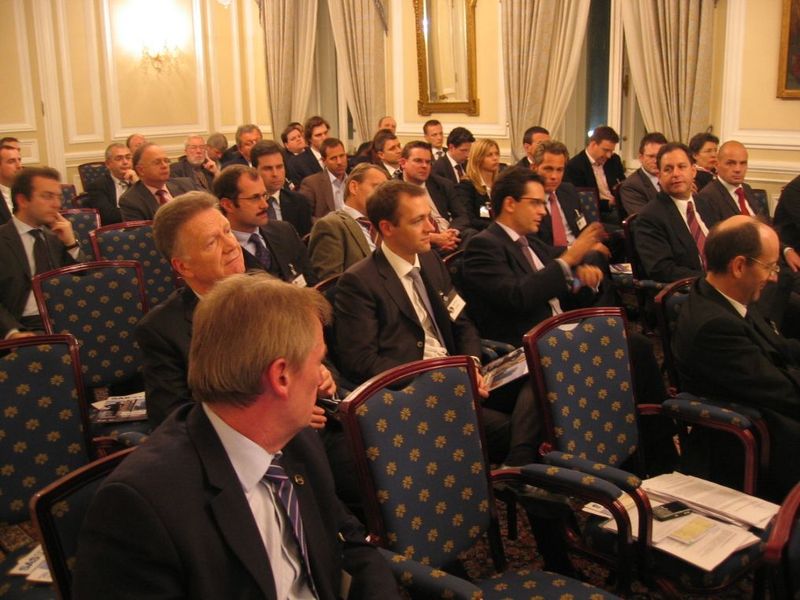
In the final part of this discussion of risks and opportunities in CEE, I was asked to give a view (see if you can spot me).

So here’s my brief summary:
What are the risks for the next year or two? First, we are still in the middle of what I call the internet, or www, recession. There are still foreign exchange and trade issues between China, Europe and the USA, and doubts over sovereign debt defaults in key countries such as Dubai, Greece and Ireland. In addition, we still have a UK AAA-rating risk of downgrade, as do other countries, and all of this will make 2010’s economic recovery a challenge, although not as hard as this year has been.Second, we are seeing a major contraction in debt amongst businesses and consumers. This means that those who can pay-off debt are doing so, leaving those who want to borrow or increase debt being those who are increasingly viewed as being higher risk because of their need. This will potentially result in a ‘debt squeeze’. The debt squeeze is where banks are left with the people who want lending being those they can’t lend to, whilst those they can lend to are the customers who don’t want it and have paid it back.Third, there are still risks, especially liquidity risks, that will require banks to seek further diversification of risk by either entering new markets or, more likely, pulling out of all markets where risks are less quantified. This could still lead therefore to national protectionism, where a bank actively seeks to focus on known home territories, whilst selling off or shutting down any more recent and therefore less known expansionism.Fourth, there are issues of corporate governance as mentioned by John McFall.Fifth, there are the nerves created by the change of leadership of the management of the internal markets of Europe, from the City-friendly Irishman Charlie McCreevy to the unknown but pro-French minister Michael Barnier.
Finally, there is a challenge with technology, in that there is fast cycle change in technologies in the front office areas of retail banking (mobile) and trading rooms (high frequency trading) versus very slow change in back office infrastructures (SEPA is now seven years old and interoperability in Clearing and Settlement is still to happen). This dual carriageway of slow lane back office and fast lane front office technologies is going to crash somewhere in the middle, unless something is done to align the two better.On the opportunities for the next year or two.First, things are cheap. If you are a bank with liquidity, then you can pick up a bargain these days. This is no better demonstrated than JPMorgan with Bear Stearns and Washington Mutual, or by Santander with Alliance & Leicester and Bradford & Bingley. If you have capital, then today is a low hanging fruit picking season.There are also opportunities for those who can innovate. With so many firms focused upon operational excellence and internal management issues, firms that have clearly unblinkered and unfettered capabilities to compete can begin to decimate.Some of this opportunity is being created by deregulations that have been years in the making. For example, non-bank payments institutions in Europe could sweep up a lot of activity now that they can be registered for processing under the Payments Services Directive. MiFID is still allowing change and competition for the MTFs, with Chi-X and BATS taking a lump or two out of those markets. Most important of all, of course, are the ability for new banks to enter weak markets. This is why the UK has flurry of new banks, from Virgin and Tesco to Metro and the Post Office.Therefore, strong, well-capitalised, financial institutions and non-banks can start to cherry pick much of the banking market profitability if they want, leaving the incumbents with the festering gristle.So, all in all, here’s the message.For most banks, 2010 will be a return to basics and a focus upon getting the most efficiency and effectiveness out of operations. Operational excellence will still be the key management competency. This was the focus for 2009, but the ‘back to basics’ approach will be even more resonating and loud. Real-time reporting will be critical from all angles, especially from a risk reporting viewpoint. The FSA has been pushing for real-time liquidity reporting, and it would not surprise me if a move towards real-time clearing and settlement becomes a focus on the table. That’s the focus of trading exchanges, such as Eurex or the Russian exchanges, and real-time is also becoming a focus in the retail world as the march of faster payments progresses. So real-time everything will be key.
Finally, intimate customer knowledge and using the tools for strong customer analysis with data mining tools will be high on the agenda. As bankers, many are looking for more cross-sell opportunities and you only get those if you have customer intimacy. This is a key.
In fact, it is best illustrated by the Tesco example given the other day, where the fact that I know your buying habits means that I can tailor my offer and rates to you on an individualised and personalised basis. If you buy lots of alcohol and cigarettes then your car and life insurances cost more than if you buy muesli and keep-fit supplements. That’s real customer intimacy.
In summary, back-to-basics, real-time everything and customer intimate operations will be the key.Istvan Lengyel of the CEE Banking Federation didn’t like the idea of real-time trading. In particular, he was concerned that if a bank collapse, such as Lehmans, takes four days today then what happens if it is four nanoseconds tomorrow. What can you do? I think he missed the fact that I was talking about real-time risk management and real-time liquidity reporting too.John McFall of the Treasury Select Committee didn’t like the idea of Tesco giving discount on car insurances based on lifestyle. He thinks that two MP’s who find one saves £100 on car insurance because he or she doesn’t smoke would be grounds for a good early day house motion.I did try to make clear that risk-adjusted pricing is the very heart of finance, and the better you are at this then the safer the markets would be. Equally, risk is at the very heart and nature of insurance. Also, if I give Tesco permissions to mine my lifestyle by being a Clubcard member, then so be it.
Chris M Skinner
Chris Skinner is best known as an independent commentator on the financial markets through his blog, TheFinanser.com, as author of the bestselling book Digital Bank, and Chair of the European networking forum the Financial Services Club. He has been voted one of the most influential people in banking by The Financial Brand (as well as one of the best blogs), a FinTech Titan (Next Bank), one of the Fintech Leaders you need to follow (City AM, Deluxe and Jax Finance), as well as one of the Top 40 most influential people in financial technology by the Wall Street Journal's Financial News. To learn more click here...


